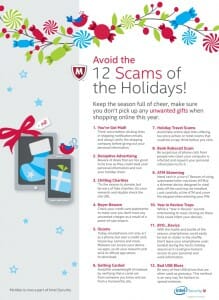 The kids are so excited as they are starting their lists for Santa, parents are already stressing about the meals, travel plans, finances and of course – getting those holiday cards in the mail.
The kids are so excited as they are starting their lists for Santa, parents are already stressing about the meals, travel plans, finances and of course – getting those holiday cards in the mail.
I would bet the most excited people are the cyber-criminals! This is their favorite time of year. Why? They are anxious for all of us to be so anxiety-ridden that our guard is down – not just offline, but especially online!
Anti-virus software company McAfee released its list of 12 holiday scams. It includes how digital criminals will be targeting you in 2014:
1. You’ve Got Mail: Think twice about clicking links in shipping notification emails. Verify the email is really from the company before giving away any personal information.
2. Deceptive Advertising: Beware of deals that are too good to be true. Make sure online and social contests are posted on a company’s official page before clicking and entering your contact information.
3. Chilling Charities: Many of you will be donating this season, but do your research and double-check the URL before you give online. Go directly to the charity’s page to make sure your money ends up in the right place.
4. Buyer Beware: Check your credit card statements every single month. Point-of-sale breaches have made headlines frequently, and likely will again before the holiday season is over. Some of your consumer rights have a time limit, so don’t wait several months before reporting any suspicious activity on your statements.
5. iScams: Your smartphone is also your credit card, house key, camera and email. It makes you more vulnerable to malware. Stick to official apps to download.
6. Getting Carded: Don’t open e-cards unless they’re from someone you know and a trustworthy site. The link could set you up for malware.
7. Holiday Travel Scams: Avoid fake online deal links offering low price airfare or hotel rooms. Make sure the links go back to a trustworthy site before you click.
8. Bank Robocall Scam: Be suspicious of phone calls from your bank or credit card who claim your account has been hacked, then ask for personal information to fix it. If you’re ever in doubt, hang up and call the company directly.
9. ATM Skimming: Before you get cash, check out your ATM. If the cover, keypad, or card slot look loose or different than usual, a skimmer device could have been placed there to steal your banking information.
10. Year in Review Traps: You’ll see a lot of year in review videos coming out in December. Clicking on suspicious links could infect your devices.
11. BYO… Device: Smartphones are often lost and stolen in the hustle and bustle of shopping and traveling during the holiday season. Don’t leave your smartphone unattended to get stolen or hacked.
12. Bad USB: Pass on the free USB giveaways. USB drives are an easy way for hackers to spread malware.
Here are some safety tips from Robert Siciliano who is an Online Security Expert to McAfee.
- Be careful when clicking. Don’t click on links in email or social media messages from people you don’t know, and use a URL expander to know what site you are going to before clicking on a shortened URL.
- Be suspicious. If a deal seems too good to be true, it probably is.
- Practice safe surfing. Use a Web safety advisor, such as McAfee® SiteAdvisor®, that protects you from going to risky sites.
- Avoid public Wi-Fi. Public Wi-Fi might be convenient, but it’s also accessible to anyone who wants to see what you are doing online.
- Shop safely online. Make sure you stick to reputable e-commerce sites that have been verified as safe by a third-party Trustmark, like McAfee SECURE™. Also look for “https” at the beginning of a site’s URL, which indicates that the site is using encryption to protect your information.
- Use security software on all your devices. Make sure you have comprehensive security protection, like McAfee LiveSafe™ service, for all your devices, including your mobile phone and tablet that also safeguards your data and includes identity protection.

